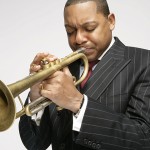 Acclaimed trumpeter Wynton Marsalis, arguably the world’s most prominent jazz musician, is set to premiere a major new project — composing a Blues Symphony for orchestra.
Acclaimed trumpeter Wynton Marsalis, arguably the world’s most prominent jazz musician, is set to premiere a major new project — composing a Blues Symphony for orchestra.
In keeping with a career that spans jazz, classical music, band leadership and high-profile advocacy for the arts, Marsalis’ symphony is epic in scope — to celebrate American history from Revolution to the present through the blues.
The Atlanta Symphony Orchestra at Morehouse College in Atlanta will perform the symphony in January at Morehouse College in Atlanta as part of annual events for Martin Luther King day. They performed two of its movements in November.
Marsalis, 48, was born in New Orleans, the self-proclaimed home of jazz.
The artistic director of Jazz at Lincoln Center in New York made his name as a virtuoso trumpeter, composer and band leader, winning nine Grammy awards and a Pulitzer Prize for Music for classical and jazz performances and compositions.
He has previously produced two epic works: All Rise and Blood on the Fields, which won the 1997 a Pulitzer for music.
Marsalis talked to Reuters about composing the Blues Symphony and jazz great such as Duke Ellington and Jelly Roll Morton,
Q: What got you excited about the Blues Symphony project?
A: “Ever since I started with music, I always wondered about the appropriation of actual things that jazz musicians play for orchestral musicians. I have had a fantastic time playing gigs with orchestras. Orchestral musicians are the best trained musicians in the world.”
Q: Was it tough to translate the ideas for a blues symphony into an orchestral form?
A: “It is difficult. You have to find what will sound good. The instruments are used in a different way. The whole process took four months of working straight and I’m still doing it in addition to all the other work I have to do and being on the road.”
Q: What can young people learn about jazz greats such as Duke Ellington and Jelly Roll Morton on whom this symphony is based?
A: “I always encourage young people if they want to know something to check it out. The thing we all want to do, young or old, is we want to continue our education. In music you are always young.”
Q: Were you nervous about writing a symphony with such a broad theme?
A: “I am never nervous about anything. I am only writing music. I would be nervous if we were in a war or something. Music works or doesn’t work.
“I grow up playing a lot of (different types of) music. I did play in marching bands … a funk band … a community band … a jazz band …. My concept of music is expansive. My concept of American history is expansive because being in New Orleans it is a historic city. You are always around history.”
Q: Why has this symphony taken so long to come together?
A: “It’s just difficult to write and difficult (for the orchestra) to play.”
Q: How do you write?
A: “I do everything long hand … I write out first the piano score … I get the outlay of the entire composition. When I get the piano score, then I begin to orchestrate it.
“The composition takes kind of long but I am fortunate because I never really have a problem with ideas. I have difficulty with the technical part because I am not really trained in orchestration. It takes me much longer to figure out how it is going to sound.”
Leave a Reply